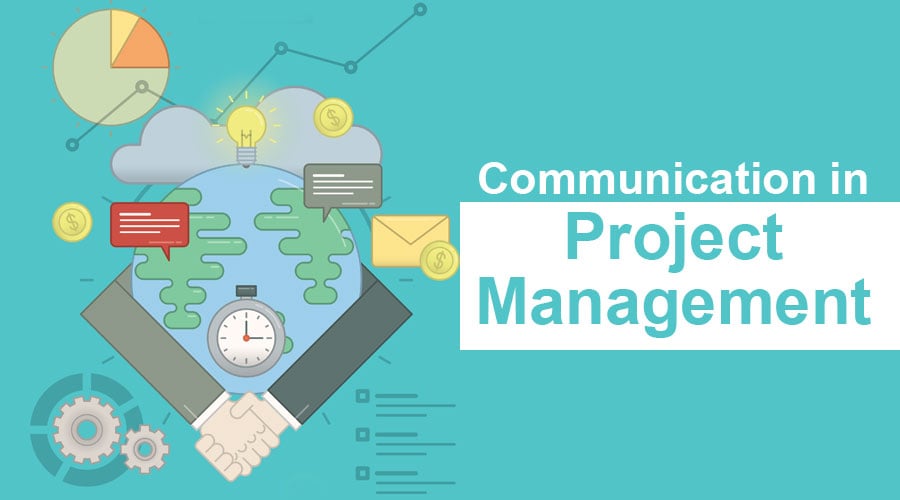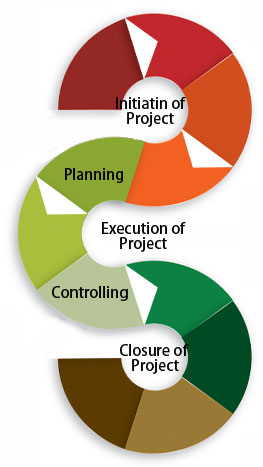Introduction to Communication in Project Management
Before we wear a jumpsuit and start describing the importance of communication in the project, we must clearly understand ‘project management. Project management is the discipline of using procedures, policies, and principles to successfully lead a project from conception to completion. In addition, it is the algorithm of planning, organizing, and controlling of company’s resources to move certain tasks/activities towards accomplishment.
Definition of Project Management
Wikipedia defines project management as “the discipline of initiating, planning, executing, controlling and closing the work of a team to achieve a specific goal and meet specific success criteria.”
Generally, we associate this term ‘project management with the industries like construction, information technology, engineering, health care which have a complex set of components to arrange in a certain fashion to reach the goal within a time span. Though each industry frames the project methodologies on the basis of its needs, yet the responsibility of the project manager is almost the same, including determining task, completion, and also quality checking of the completed product.
Phases of Communication in Project Management
From conceptualization to completion, there are five phases used to deliver a successful articulated outcome.
1. Initiation: This phase determines the beginning of the project. Once the project manager gets approval, he or she starts the documentation of the concept description, which includes the objective based on the purpose of the project and its desired outcome with the calculation of risks.
2. Planning: In this phase, the project manager verbalizes a strategy to accomplish the target with strict adherence to the timeline. He or she may choose team members and ascertain the tasks/activities, allocating the same among the team members with given milestones and key success parameters. Setting a work schedule and communication line is also considered during this phase.
3. Execution: The project manager implements the resources to produce the desired outcome as chalked out in the project plan.
4. Controlling: In this phase, the project manager monitors the teamwork to align the projected performance as determined in the planning phase.
5. Closure: At the final stage, the project manager delivers the final outcome to his or her superiors and facilitates the administrative task if any remains.
Effective Communication in Project Management
To accomplish the target successfully, effective communication is the key factor that the project manager should keep in mind from formulating a strategy. That is why we can say efficient and effective communication is the lifeblood of any kind of project management. Many projects fail due to ineffectiveness or lack of communication. According to the report of PMI (Project Management Institute), a project manager should spend 90% of his or her time communicating with stakeholders and team members. Successful leadership depends on clear communication about goal, performance, responsibility, achievement, challenges, as well as customer feedback with the team members who generally belong to a diverse group of people. Regular reporting of the project’s progress and status to the stakeholders is the decisive portion of efficacious project leadership. So, proper communication management, which consists of three processes, mitigates the risk of failure to some extent. These are some of the effective communication in project management.
- Plan of communication
- Manage communication
- Monitor communication
1. Plan of Communication
The first step in the communication plan is figuring out the communication requirement analysis. There is so much information regarding the project, but which information needs to be sent to whom’ is important to decide. The communication plan must be detailed enough which covers up all the factors, including audience (team members, stakeholders, customer), objective, channel ( the medium of communication such as verbal, writing ), etc.
2. Manage Project Communication
It is the utmost responsibility of the project manager to implement the communication plan.
- Collecting and analyzing data.
- Distributing and transmitting messages.
- Retrieval of any stored communication.
- Disposal of any old communication report or project closure or set of date.
3. Monitor Communication Plan
The project manager should monitor and control the communication management plan throughout its life cycle.
In the context of project communication, it is the ‘exchanging of knowledge, skills, and experience.’ There are three crucial areas of communication that pay a lot of weightage to the success of any project.
They are:
- Internally exchanging information.
- Exchanging information and report with project stakeholders.
- Project marketing.
It is important that the project manager should conceive the communication strategy at the behest of the project. What communication methods would follow is the earnest decision of the project leader. Though the methodologies, either active or passive, may be differentiated on the basis of organizational structure and industry standard. These are some methods of effective communication which a project manager can adapt to communicate efficiently and deliberately with team members and stakeholders.
Methods of Effective Communication
Communicating effectively helps to develop a positive environment.
Let’s find a few methods of effective communication.
1. Active or Synchronous Communication
If all the members or parties are taking part in exchanging information at the same time, communication is called synchronous communication.
- Live Meeting – Joining all team members at the same location.
- Video Conference – Live video conference.
- Conference Call – A telephone call where two or more than people participate.
- Audio con- Call – Like conference call, but it is conducted online using software like Skype.
- Computer-Assisted Conference – Audio conference call with a connection of computers where a spreadsheet or document is displayed, and both the parties can edit it.
- I.M (Instant Messaging) – Exchange of voice messages or text using pop-up windows like Google Hangout.
- Texting – Exchange of messages through mobile phones or personal digital assistants.
2. Passive or Asynchronous Communication
Many types of communication in Project Management do not require the presence of all team members or parties at the same place. This type of communication is called asynchronous communication.
- E-mail – Electronic mail is widely used to coordinate the project and to communicate among team members.
- Fax – The fax machine is widely used around the world as a trustworthy process of transmitting documents.
- Blogs – Some project managers write blogs of their experiences of various challenges they have faced during the execution of the project. These blogs may be helpful for the future decision-making process.
With the advancement of modern technologies, it becomes possible to assemble all the team members from anywhere in the world.
The project manager may choose any channel of communication with team members or stakeholders, but the communication becomes effective by the realization of what is being communicated with effective feedback being obtained from various stakeholders. Therefore, active listening, strong presentation skill, conflict resolution skill, etc., are the traits of core competencies of a successful project manager.
Recommended Articles
This has been a guide to Communication in Project Management. Here we discussed the concept, phases, and various effective methods of communication in Project Management. You can also go through our other suggested articles to learn more –




